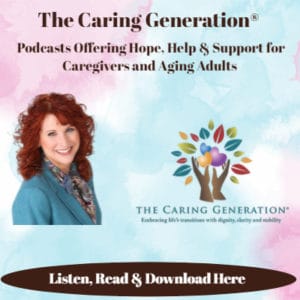How to Avoid Melting Down and Freaking Out
Being a caregiver is challenging. Our good days are great. On our bad days, we want to know how to avoid a meltdown. Caregiving, whether we do it for a profession or a family member, poses emotional and physical risks. Stress and feelings of burnout make us feel angry and increase the likelihood of melting down and freaking out.
Melting Down and Freaking Out
Caregiving responsibilities weigh on your mind. You dream about this long list of things that you were supposed to do—and you are so stressed, you can’t remember if you did any of them.
Melting down and freaking out are common in caregiving when we feel in over our heads. It is easy to feel like we’re drowning because there is so much to do and rarely enough time.
Some women are caregivers during the day at work, and caregivers on evenings and weekends. These are the more challenging situations when it seems there is no getaway from being a caregiver. Caregivers give up in frustration because they don’t know how to make situations better. Improving caregiving situations takes effort—consistent effort—over some time.
Don’t Feel Embarrassed
One of the first recommendations to avoid melting down and freaking out is to accept your feelings and not feel embarrassed. Every caregiver, new caregivers, and experienced caregivers have days that feel out of control. It is impossible to know everything that a caregiver should know.
If you are a professional caregiver like a CNA or a nurse, you know more than most family caregivers because you have attended courses and training. Professional caregivers know the value of this training and how it improved their caregiving skills. Training means that professional caregivers are ahead of family caregivers in knowledge and experience—yet there are still things to learn.
Family members believe they know it all and don’t need any help even when they are melting down and freaking out. Family caregivers sometimes freak out professional caregivers by their actions.
Caregivers Have a Duty to Help Each Other
People, in general, have a fear of asking for help. Caregivers, professional or family, are no different. One of my mottos is that “it’s the questions you don’t ask that result in the most trouble.” Years of training staff to manage care for aging adults proved this statement to be accurate.
Everyone has questions. How many times are we at a presentation and the presenter asks if anyone has questions? You have a question but don’t raise your hand. The person sitting next to you and the person behind you also has a question. No one raises a hand. No one asks a question.
No one wants to raise their hand because we view asking questions as embarrassing or stupid. The less afraid you become about asking questions, the more successful you will be.
Caregiver Support Groups and Course Help Manage Freak Outs and Meltdowns
The answer to solving freakouts and meltdowns is to get help. Today it’s easier than you think to attend a support group or take a caregiving class online. The old way of learning or joining a support group was to drive to a physical location. Driving to physical locations to attend support groups and courses is an activity of the past.
Because caregivers are stretched for time, freaking out and melting down, support has to be accessible and easy.
Find a Trusted Source of Support
Whether you find help here or on Pamela’s website—find help today. Find help before the caregiving situation becomes worse, turns into a crisis, and then turns into a disaster. Don’t be the person who says; I should have joined that group, or I should have joined that class.
Be a person of action. Be proactive and become more informed so that you can avoid meltdowns and freakouts. Learn to become comfortable making decisions, managing, care, and advocating. It’s not possible for everyone to know everything. Life teaches us that. The more we think we know, the less we know.
Be consistently curious. Be open-minded. When your mind stops you by saying no to help, or I can’t do that, stop your mind from going to the negative. Think positively.
Looking for more resources for caregiving families or yourself, check out Pamela’s complimentary online webinar program about caring for elderly loved ones. https://pameladwilson.com/support-caring-for-elderly-parents-overwhelmed-caregiver-support-online-course/
© 2019 Pamela D. Wilson, All Rights Reserved.
Return to Difficult Discussions Category Return to All Category Page



